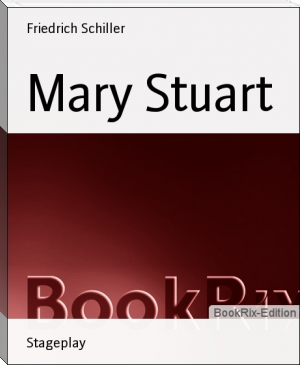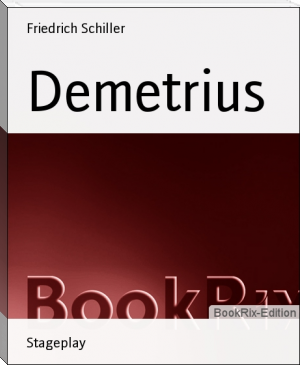Mary Stuart - Friedrich Schiller (ebook reader screen txt) 📗

- Author: Friedrich Schiller
Book online «Mary Stuart - Friedrich Schiller (ebook reader screen txt) 📗». Author Friedrich Schiller
prime
While each step leads her towards the expecting tomb?
By Heavens, I hope thou wilt full many a year
Walk o'er the Stuart's grave, and ne'er become
Thyself the instrument of her sad end.
BURLEIGH.
Lord Leicester hath not always held this tone.
LEICESTER.
'Tis true, I in the court of justice gave
My verdict for her death; here, in the council,
I may consistently speak otherwise
Here, right is not the question, but advantage.
Is this a time to fear her power, when France,
Her only succor, has abandoned her?
When thou preparest with thy hand to bless
The royal son of France, when the fair hope
Of a new, glorious stem of sovereigns
Begins again to blossom in this land?
Why hasten then her death? She's dead already.
Contempt and scorn are death to her; take heed
Lest ill-timed pity call her into life.
'Tis therefore my advice to leave the sentence,
By which her life is forfeit, in full force.
Let her live on; but let her live beneath
The headsman's axe, and, from the very hour
One arm is lifted for her, let it fall.
ELIZABETH (rises).
My lords, I now have heard your several thoughts,
And give my ardent thanks for this your zeal.
With God's assistance, who the hearts of kings
Illumines, I will weigh your arguments,
And choose what best my judgment shall approve.
[To BURLEIGH.
[Lord Burleigh's honest fears, I know it well,
Are but the offspring of his faithful care;
But yet, Lord Leicester has most truly said,
There is no need of haste; our enemy
Hath lost already her most dangerous sting -
The mighty arm of France: the fear that she
Might quickly be the victim of their zeal
Will curb the blind impatience of her friends.]
[1] The picture of Ate, the goddess of mischief, we are acquainted
with from Homer, II. v. 91, 130. I. 501. She is a daughter of
Jupiter, and eager to prejudice every one, even the immortal gods.
She counteracted Jupiter himself, on which account he seized her by
her beautiful hair, and hurled her from heaven to the earth, where
she now, striding over the heads of men, excites them to evil in
order to involve them in calamity. - HERDER.
Shakspeare has, in Julius Caesar, made a fine use of this image: -
"And Caesar's spirit ranging for revenge
with Ate by his side, come hot from hell,
Shall in these confines, with a monarch's voice,
Cry havoc, and let slip the dogs of war."
I need not point out to the reader the beautiful propriety of
introducing the evil spirit on this occasion. - TRANSLATOR.
SCENE IV.
Enter SIR AMIAS PAULET and MORTIMER.
ELIZABETH.
There's Sir Amias Paulet; noble sir,
What tidings bring you?
PAULET.
Gracious sovereign,
My nephew, who but lately is returned
From foreign travel, kneels before thy feet,
And offers thee his first and earliest homage,
Grant him thy royal grace, and let him grow
And flourish in the sunshine of thy favor.
MORTIMER (kneeling on one knee).
Long live my royal mistress! Happiness
And glory from a crown to grace her brows!
ELIZABETH.
Arise, sir knight; and welcome here in England;
You've made, I hear, the tour, have been in France
And Rome, and tarried, too, some time at Rheims:
Tell me what plots our enemies are hatching?
MORTIMER.
May God confound them all! And may the darts
Which they shall aim against my sovereign,
Recoiling, strike their own perfidious breasts!
ELIZABETH.
Did you see Morgan, and the wily Bishop
Of Ross?
MORTIMER.
I saw, my queen, all Scottish exiles
Who forge at Rheims their plots against this realm.
I stole into their confidence in hopes
To learn some hint of their conspiracies.
PAULET.
Private despatches they intrusted to him,
In cyphers, for the Queen of Scots, which he,
With loyal hand, hath given up to us.
ELIZABETH.
Say, what are then their latest plans of treason?
MORTIMER.
It struck them all as 'twere a thunderbolt,
That France should leave them, and with England close
This firm alliance; now they turn their hopes
Towards Spain - -
ELIZABETH.
This, Walsingham hath written us.
MORTIMER.
Besides, a bull, which from the Vatican
Pope Sixtus lately levelled at thy throne,
Arrived at Rheims, as I was leaving it;
With the next ship we may expect it here.
LEICESTER.
England no more is frightened by such arms.
BURLEIGH.
They're always dangerous in bigots' hands.
ELIZABETH (looking steadfastly at MORTIMER).
Your enemies have said that you frequented
The schools at Rheims, and have abjured your faith.
MORTIMER.
So I pretended, that I must confess;
Such was my anxious wish to serve my queen.
ELIZABETH (to PAULET, who presents papers to her).
What have you there?
PAULET.
'Tis from the Queen of Scots.
'Tis a petition, and to thee addressed.
BURLEIGH (hastily catching at it).
Give me the paper.
PAULET (giving it to the QUEEN).
By your leave, my lord
High-treasurer; the lady ordered me
To bring it to her majesty's own hands.
She says I am her enemy; I am
The enemy of her offences only,
And that which is consistent with my duty
I will, and readily, oblige her in.
[The QUEEN takes the letter: as she reads it MORTIMER
and LEICESTER speak some words in private.
BURLEIGH (to PAULET).
What may the purport of the letter be?
Idle complaints, from which one ought to screen
The queen's too tender heart.
PAULET.
What it contains
She did not hide from me; she asks a boon;
She begs to be admitted to the grace
Of speaking with the queen.
BURLEIGH.
It cannot be.
TALBOT.
Why not? Her supplication's not unjust.
BURLEIGH.
For her, the base encourager of murder;
Her, who hath thirsted for our sovereign's blood,
The privilege to see the royal presence
Is forfeited: a faithful counsellor
Can never give this treacherous advice.
TALBOT.
And if the queen is gracious, sir, are you
The man to hinder pity's soft emotions?
BURLEIGH.
She is condemned to death; her head is laid
Beneath the axe, and it would ill become
The queen to see a death-devoted head.
The sentence cannot have its execution
If the queen's majesty approaches her,
For pardon still attends the royal presence,
As sickness flies the health-dispensing hand.
ELIZABETH (having read the letter, dries her tears).
Oh, what is man! What is the bliss of earth!
To what extremities is she reduced
Who with such proud and splendid hopes began!
Who, called to sit on the most ancient throne
Of Christendom, misled by vain ambition,
Hoped with a triple crown to deck her brows!
How is her language altered, since the time
When she assumed the arms of England's crown,
And by the flatterers of her court was styled
Sole monarch of the two Britannic isles!
Forgive me, lords, my heart is cleft in twain,
Anguish possesses me, and my soul bleeds
To think that earthly goods are so unstable,
And that the dreadful fate which rules mankind
Should threaten mine own house, and scowl so near me.
TALBOT.
Oh, queen! the God of mercy hath informed
Your heart; Oh! hearken to this heavenly guidance.
Most grievously, indeed, hath she atoned.
Her grievous crime, and it is time that now,
At last, her heavy penance have an end.
Stretch forth your hand to raise this abject queen,
And, like the luminous vision of an angel,
Descend into her gaol's sepulchral night.
BURLEIGH.
Be steadfast, mighty queen; let no emotion
Of seeming laudable humanity
Mislead thee; take not from thyself the power
Of acting as necessity commands.
Thou canst not pardon her, thou canst not save her:
Then heap not on thyself the odious blame,
That thou, with cruel and contemptuous triumph,
Didst glut thyself with gazing on thy victim.
LEICESTER.
Let us, my lords, remain within our bounds;
The queen is wise, and doth not need our counsels
To lead her to the most becoming choice.
This meeting of the queens hath naught in common
With the proceedings of the court of justice.
The law of England, not the monarch's will,
Condemns the Queen of Scotland, and 'twere worthy
Of the great soul of Queen Elizabeth,
To follow the soft dictates of her heart,
Though justice swerves not from its rigid path.
ELIZABETH.
Retire, my lords. We shall, perhaps, find means
To reconcile the tender claims of pity
With what necessity imposes on us.
And now retire.
[The LORDS retire; she calls SIR EDWARD MORTIMER back.
Sir Edward Mortimer!
SCENE V.
ELIZABETH, MORTIMER.
ELIZABETH (having measured him for some time with her eyes in silence).
You've shown a spirit of adventurous courage
And self-possession, far beyond your years.
He who has timely learnt to play so well
The difficult dissembler's needful task
Becomes a perfect man before his time,
And shortens his probationary years.
Fate calls you to a lofty scene of action;
I prophesy it, and can, happily
For you, fulfil, myself, my own prediction.
MORTIMER.
Illustrious mistress, what I am, and all
I can accomplish, is devoted to you.
ELIZABETH.
You've made acquaintance with the foes of England.
Their hate against me is implacable;
Their fell designs are inexhaustible.
As yet, indeed, Almighty Providence
Hath shielded me; but on my brows the crown
Forever trembles, while she lives who fans
Their bigot-zeal, and animates their hopes.
MORTIMER.
She lives no more, as soon as you command it.
ELIZABETH.
Oh, sir! I thought I saw my labors end,
And I am come no further than at first,
I wished to let the laws of England act,
And keep my own hands pure from blood's defilement.
The sentence is pronounced - what gain I by it?
It must be executed, Mortimer,
And I must authorize the execution.
The blame will ever light on me, I must
Avow it, nor can save appearances.
That is the worst - -
MORTIMER.
But can appearances
Disturb your conscience where the cause is just?
ELIZABETH.
You are unpractised in the world, sir knight;
What we appear, is subject to the judgment
Of all mankind, and what we are, of no man.
No one will be convinced that I am right:
I must take care that my connivance in
Her death be wrapped in everlasting doubt.
In deeds of such uncertain double visage
Safety lies only in obscurity.
Those measures are the worst that stand avowed;
What's not abandoned, is not wholly lost.
MORTIMER (seeking to learn her meaning).
Then it perhaps were best - -
ELIZABETH (quick).
Ay, surely 'twere
The
While each step leads her towards the expecting tomb?
By Heavens, I hope thou wilt full many a year
Walk o'er the Stuart's grave, and ne'er become
Thyself the instrument of her sad end.
BURLEIGH.
Lord Leicester hath not always held this tone.
LEICESTER.
'Tis true, I in the court of justice gave
My verdict for her death; here, in the council,
I may consistently speak otherwise
Here, right is not the question, but advantage.
Is this a time to fear her power, when France,
Her only succor, has abandoned her?
When thou preparest with thy hand to bless
The royal son of France, when the fair hope
Of a new, glorious stem of sovereigns
Begins again to blossom in this land?
Why hasten then her death? She's dead already.
Contempt and scorn are death to her; take heed
Lest ill-timed pity call her into life.
'Tis therefore my advice to leave the sentence,
By which her life is forfeit, in full force.
Let her live on; but let her live beneath
The headsman's axe, and, from the very hour
One arm is lifted for her, let it fall.
ELIZABETH (rises).
My lords, I now have heard your several thoughts,
And give my ardent thanks for this your zeal.
With God's assistance, who the hearts of kings
Illumines, I will weigh your arguments,
And choose what best my judgment shall approve.
[To BURLEIGH.
[Lord Burleigh's honest fears, I know it well,
Are but the offspring of his faithful care;
But yet, Lord Leicester has most truly said,
There is no need of haste; our enemy
Hath lost already her most dangerous sting -
The mighty arm of France: the fear that she
Might quickly be the victim of their zeal
Will curb the blind impatience of her friends.]
[1] The picture of Ate, the goddess of mischief, we are acquainted
with from Homer, II. v. 91, 130. I. 501. She is a daughter of
Jupiter, and eager to prejudice every one, even the immortal gods.
She counteracted Jupiter himself, on which account he seized her by
her beautiful hair, and hurled her from heaven to the earth, where
she now, striding over the heads of men, excites them to evil in
order to involve them in calamity. - HERDER.
Shakspeare has, in Julius Caesar, made a fine use of this image: -
"And Caesar's spirit ranging for revenge
with Ate by his side, come hot from hell,
Shall in these confines, with a monarch's voice,
Cry havoc, and let slip the dogs of war."
I need not point out to the reader the beautiful propriety of
introducing the evil spirit on this occasion. - TRANSLATOR.
SCENE IV.
Enter SIR AMIAS PAULET and MORTIMER.
ELIZABETH.
There's Sir Amias Paulet; noble sir,
What tidings bring you?
PAULET.
Gracious sovereign,
My nephew, who but lately is returned
From foreign travel, kneels before thy feet,
And offers thee his first and earliest homage,
Grant him thy royal grace, and let him grow
And flourish in the sunshine of thy favor.
MORTIMER (kneeling on one knee).
Long live my royal mistress! Happiness
And glory from a crown to grace her brows!
ELIZABETH.
Arise, sir knight; and welcome here in England;
You've made, I hear, the tour, have been in France
And Rome, and tarried, too, some time at Rheims:
Tell me what plots our enemies are hatching?
MORTIMER.
May God confound them all! And may the darts
Which they shall aim against my sovereign,
Recoiling, strike their own perfidious breasts!
ELIZABETH.
Did you see Morgan, and the wily Bishop
Of Ross?
MORTIMER.
I saw, my queen, all Scottish exiles
Who forge at Rheims their plots against this realm.
I stole into their confidence in hopes
To learn some hint of their conspiracies.
PAULET.
Private despatches they intrusted to him,
In cyphers, for the Queen of Scots, which he,
With loyal hand, hath given up to us.
ELIZABETH.
Say, what are then their latest plans of treason?
MORTIMER.
It struck them all as 'twere a thunderbolt,
That France should leave them, and with England close
This firm alliance; now they turn their hopes
Towards Spain - -
ELIZABETH.
This, Walsingham hath written us.
MORTIMER.
Besides, a bull, which from the Vatican
Pope Sixtus lately levelled at thy throne,
Arrived at Rheims, as I was leaving it;
With the next ship we may expect it here.
LEICESTER.
England no more is frightened by such arms.
BURLEIGH.
They're always dangerous in bigots' hands.
ELIZABETH (looking steadfastly at MORTIMER).
Your enemies have said that you frequented
The schools at Rheims, and have abjured your faith.
MORTIMER.
So I pretended, that I must confess;
Such was my anxious wish to serve my queen.
ELIZABETH (to PAULET, who presents papers to her).
What have you there?
PAULET.
'Tis from the Queen of Scots.
'Tis a petition, and to thee addressed.
BURLEIGH (hastily catching at it).
Give me the paper.
PAULET (giving it to the QUEEN).
By your leave, my lord
High-treasurer; the lady ordered me
To bring it to her majesty's own hands.
She says I am her enemy; I am
The enemy of her offences only,
And that which is consistent with my duty
I will, and readily, oblige her in.
[The QUEEN takes the letter: as she reads it MORTIMER
and LEICESTER speak some words in private.
BURLEIGH (to PAULET).
What may the purport of the letter be?
Idle complaints, from which one ought to screen
The queen's too tender heart.
PAULET.
What it contains
She did not hide from me; she asks a boon;
She begs to be admitted to the grace
Of speaking with the queen.
BURLEIGH.
It cannot be.
TALBOT.
Why not? Her supplication's not unjust.
BURLEIGH.
For her, the base encourager of murder;
Her, who hath thirsted for our sovereign's blood,
The privilege to see the royal presence
Is forfeited: a faithful counsellor
Can never give this treacherous advice.
TALBOT.
And if the queen is gracious, sir, are you
The man to hinder pity's soft emotions?
BURLEIGH.
She is condemned to death; her head is laid
Beneath the axe, and it would ill become
The queen to see a death-devoted head.
The sentence cannot have its execution
If the queen's majesty approaches her,
For pardon still attends the royal presence,
As sickness flies the health-dispensing hand.
ELIZABETH (having read the letter, dries her tears).
Oh, what is man! What is the bliss of earth!
To what extremities is she reduced
Who with such proud and splendid hopes began!
Who, called to sit on the most ancient throne
Of Christendom, misled by vain ambition,
Hoped with a triple crown to deck her brows!
How is her language altered, since the time
When she assumed the arms of England's crown,
And by the flatterers of her court was styled
Sole monarch of the two Britannic isles!
Forgive me, lords, my heart is cleft in twain,
Anguish possesses me, and my soul bleeds
To think that earthly goods are so unstable,
And that the dreadful fate which rules mankind
Should threaten mine own house, and scowl so near me.
TALBOT.
Oh, queen! the God of mercy hath informed
Your heart; Oh! hearken to this heavenly guidance.
Most grievously, indeed, hath she atoned.
Her grievous crime, and it is time that now,
At last, her heavy penance have an end.
Stretch forth your hand to raise this abject queen,
And, like the luminous vision of an angel,
Descend into her gaol's sepulchral night.
BURLEIGH.
Be steadfast, mighty queen; let no emotion
Of seeming laudable humanity
Mislead thee; take not from thyself the power
Of acting as necessity commands.
Thou canst not pardon her, thou canst not save her:
Then heap not on thyself the odious blame,
That thou, with cruel and contemptuous triumph,
Didst glut thyself with gazing on thy victim.
LEICESTER.
Let us, my lords, remain within our bounds;
The queen is wise, and doth not need our counsels
To lead her to the most becoming choice.
This meeting of the queens hath naught in common
With the proceedings of the court of justice.
The law of England, not the monarch's will,
Condemns the Queen of Scotland, and 'twere worthy
Of the great soul of Queen Elizabeth,
To follow the soft dictates of her heart,
Though justice swerves not from its rigid path.
ELIZABETH.
Retire, my lords. We shall, perhaps, find means
To reconcile the tender claims of pity
With what necessity imposes on us.
And now retire.
[The LORDS retire; she calls SIR EDWARD MORTIMER back.
Sir Edward Mortimer!
SCENE V.
ELIZABETH, MORTIMER.
ELIZABETH (having measured him for some time with her eyes in silence).
You've shown a spirit of adventurous courage
And self-possession, far beyond your years.
He who has timely learnt to play so well
The difficult dissembler's needful task
Becomes a perfect man before his time,
And shortens his probationary years.
Fate calls you to a lofty scene of action;
I prophesy it, and can, happily
For you, fulfil, myself, my own prediction.
MORTIMER.
Illustrious mistress, what I am, and all
I can accomplish, is devoted to you.
ELIZABETH.
You've made acquaintance with the foes of England.
Their hate against me is implacable;
Their fell designs are inexhaustible.
As yet, indeed, Almighty Providence
Hath shielded me; but on my brows the crown
Forever trembles, while she lives who fans
Their bigot-zeal, and animates their hopes.
MORTIMER.
She lives no more, as soon as you command it.
ELIZABETH.
Oh, sir! I thought I saw my labors end,
And I am come no further than at first,
I wished to let the laws of England act,
And keep my own hands pure from blood's defilement.
The sentence is pronounced - what gain I by it?
It must be executed, Mortimer,
And I must authorize the execution.
The blame will ever light on me, I must
Avow it, nor can save appearances.
That is the worst - -
MORTIMER.
But can appearances
Disturb your conscience where the cause is just?
ELIZABETH.
You are unpractised in the world, sir knight;
What we appear, is subject to the judgment
Of all mankind, and what we are, of no man.
No one will be convinced that I am right:
I must take care that my connivance in
Her death be wrapped in everlasting doubt.
In deeds of such uncertain double visage
Safety lies only in obscurity.
Those measures are the worst that stand avowed;
What's not abandoned, is not wholly lost.
MORTIMER (seeking to learn her meaning).
Then it perhaps were best - -
ELIZABETH (quick).
Ay, surely 'twere
The
Free e-book «Mary Stuart - Friedrich Schiller (ebook reader screen txt) 📗» - read online now
Similar e-books:





Comments (0)